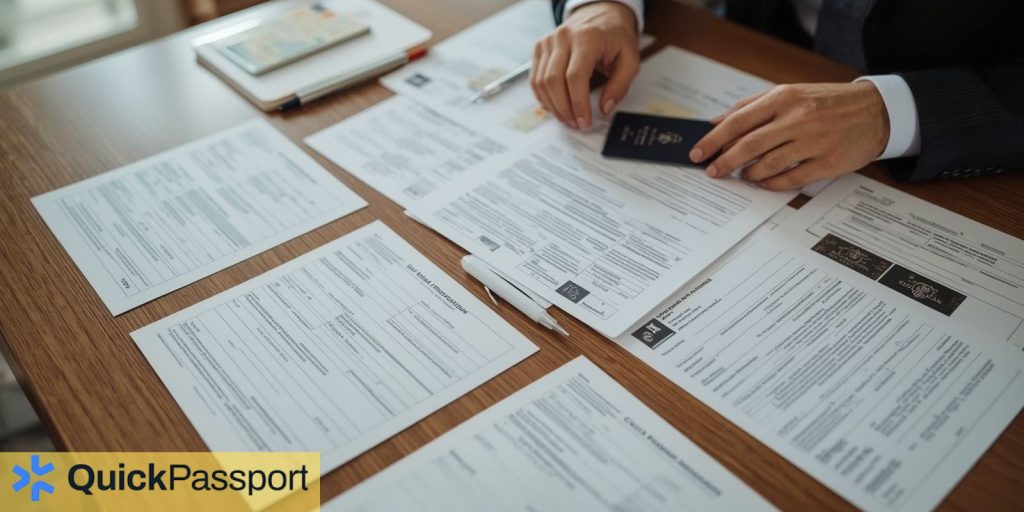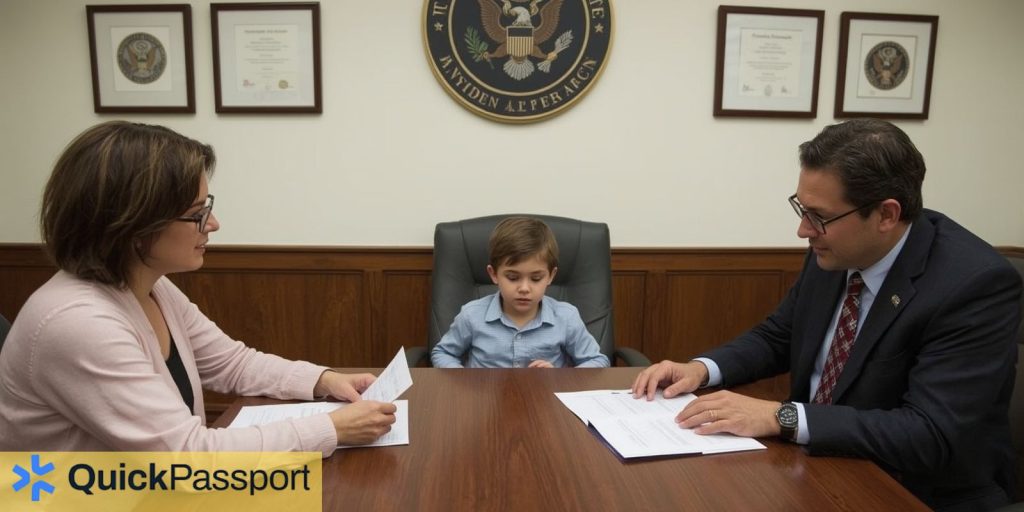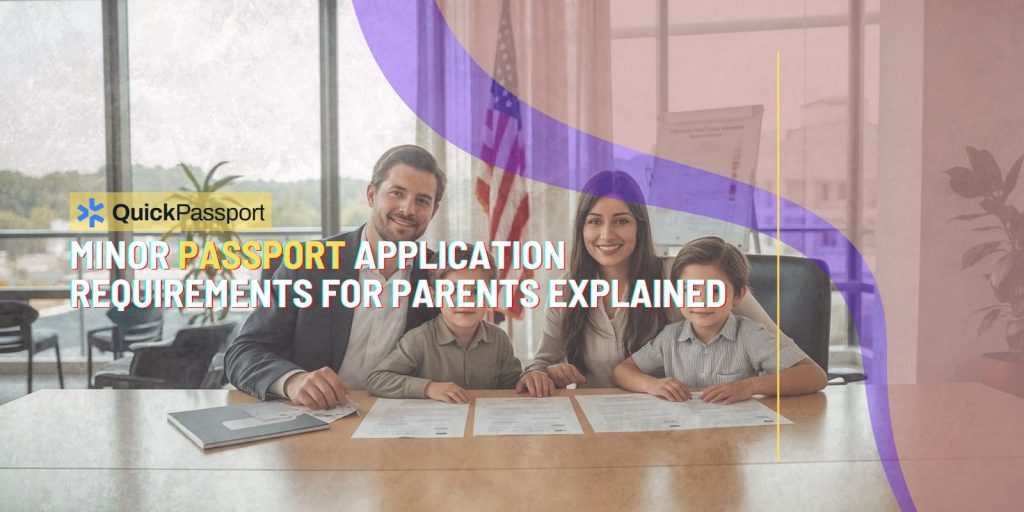Navigating the minor passport application requirements for parents can feel overwhelming, especially when you’re planning that long-awaited family vacation or preparing for an unexpected international trip. The process involves multiple forms, specific documentation, and strict legal requirements that must be met to ensure your child receives their passport without delays or complications.
Understanding the minor passport application process is crucial for parents because children under 16 cannot simply walk into a passport office and apply on their own. The U.S. Department of State has implemented comprehensive safeguards to protect minors from potential abduction or unauthorized travel, which means parents must provide extensive documentation and follow specific procedures that differ significantly from adult passport applications.
The complexity of these requirements stems from the need to verify parental consent, establish the child’s citizenship, and confirm the parent’s legal authority to obtain travel documents for the minor. These protective measures, while sometimes frustrating for parents in a hurry, serve an important purpose in child safety and national security.
Parents often discover that obtaining a passport for their child requires more time and preparation than they initially anticipated. The process involves gathering birth certificates, proof of citizenship, parental identification, photographs that meet specific requirements, and in many cases, ensuring both parents are present during the application or providing notarized consent forms from the absent parent.
Whether you’re applying for your child’s first passport or renewing an existing one, understanding these requirements upfront can save you multiple trips to the passport office and prevent delays that could jeopardize your travel plans. The investment in proper preparation pays dividends in reducing stress and ensuring a smooth application experience for your entire family.
Key Takeaways
- Both parents must typically be present during the minor passport application process, or provide notarized consent forms if one parent cannot attend the appointment
- Required documentation includes the child’s certified birth certificate, proof of U.S. citizenship, both parents’ valid identification, and a completed DS-11 form
- Children under 16 cannot renew passports by mail and must apply in person with parental presence, regardless of whether they previously held a passport
- Passport photos must meet strict specifications including size, background color, facial expression, and recent timeframe requirements
- Processing times vary significantly between routine service (6-8 weeks) and expedited service (2-3 weeks), with additional fees for faster processing
- Special circumstances require additional documentation such as sole custody arrangements, name changes, or situations where one parent is unavailable
- Fees for minor passports differ from adult applications and include separate charges for the passport book, card options, and expedited processing
- Appointment scheduling is often required at passport acceptance facilities, and walk-in availability may be limited depending on location and season
Overview of Minor Passport Application Requirements
The minor passport application process represents one of the most regulated aspects of U.S. travel document issuance, designed specifically to protect children while enabling legitimate family travel. Parents must understand that applying for a child’s passport involves significantly more documentation and stricter procedures compared to adult applications, reflecting the government’s commitment to preventing child abduction and unauthorized international travel.

The foundation of minor passport requirements rests on establishing three critical elements: the child’s U.S. citizenship, parental relationship and authority, and consent from all legal guardians. These requirements apply to all children under 16 years of age, regardless of whether they’re applying for their first passport or replacing an expired document. Unlike adults, minors cannot renew passports by mail and must always appear in person with appropriate parental supervision.
Parents should recognize that the application process typically requires 6-8 weeks for standard processing, though expedited services can reduce this timeframe to 2-3 weeks for an additional fee. However, during peak travel seasons or periods of high demand, these timeframes may extend considerably. Planning ahead becomes essential, particularly for families with firm travel dates or those applying during busy periods like spring and summer months.
The complexity of minor passport applications also varies based on family circumstances. Traditional two-parent households where both parents can appear together face the most straightforward process, while single parents, divorced parents, or families with special custody arrangements must navigate additional documentation requirements and potentially more complex approval procedures.
Essential Documentation for Minor Passport Applications
Gathering the correct documentation represents the most critical step in the minor passport application process, as missing or incorrect documents will result in application rejection and delays. Parents must provide original or certified copies of specific documents that cannot be substituted with alternatives, making preparation essential for a successful application experience.
The primary document establishing your child’s U.S. citizenship must be an official birth certificate issued by the city, county, or state where the birth occurred. Hospital-issued birth certificates, photocopies, or notarized copies are not acceptable. If your child was born abroad to U.S. citizen parents, you’ll need to provide a Consular Report of Birth Abroad or Certificate of Citizenship. Parents who cannot locate their child’s birth certificate must contact the vital records office in the birth state to obtain a certified copy before proceeding with the passport application.
Parental identification requirements demand that both parents present valid, government-issued photo identification such as a driver’s license, state ID card, military ID, or current U.S. passport. The identification must be current and clearly show the parent’s photograph and signature. Expired identification documents are not acceptable, even if the expiration is recent. Parents should verify their ID validity well before the passport appointment to avoid last-minute complications.
The relationship between parents and child must be established through documentation that clearly shows parental authority. When both parents’ names appear on the birth certificate, this document typically suffices. However, situations involving adoption, name changes, or complex family structures may require additional documentation such as adoption decrees, court orders, or legal name change documents. Parents should consult with passport officials if questions arise about their specific documentation needs.
Passport photographs for minors must meet the same strict specifications as adult photos, including recent capture (within six months), specific dimensions (2×2 inches), white or off-white background, and clear facial visibility. For infants and young children, these requirements can be challenging to meet, but they remain non-negotiable. Parents should consider professional passport photo services to ensure compliance with all specifications.
Parental Consent and Presence Requirements
The parental consent and presence requirements for minor passport applications represent the most stringent aspect of the entire process, designed to prevent unauthorized travel and protect children from potential abduction situations. These requirements vary depending on family circumstances but generally mandate that both legal parents participate in the application process either through physical presence or notarized consent documentation.
When both parents are available and can attend the passport appointment together, the process follows a straightforward path. Both parents must present valid identification, sign the DS-11 application form in the presence of the passport acceptance agent, and provide sworn testimony regarding their parental relationship to the child. This scenario represents the ideal situation from the State Department’s perspective and typically results in the smoothest application experience.
Single-parent situations require careful navigation of additional requirements. If one parent has sole legal custody, they must provide court documentation establishing this custody arrangement, such as a divorce decree or custody order that specifically grants sole custody and travel authorization rights. Death certificates must be provided if one parent is deceased, along with appropriate legal documentation establishing the surviving parent’s authority. These documents must be official copies, not photocopies or notarized reproductions.
Situations where one parent cannot attend the appointment but both parents share legal custody require the absent parent to complete Form DS-3053, Statement of Consent. This form must be notarized and include a photocopy of the absent parent’s valid identification. The notarization must be recent, typically within three months of the passport application date. Parents should note that some passport acceptance facilities may have specific requirements regarding the age of notarized consent forms.
Special circumstances such as military deployment, incarceration, or international residence of one parent require additional documentation and may involve more complex approval processes. Parents facing these situations should contact passport services directly to understand specific requirements and potential alternative procedures. The State Department recognizes these unique circumstances but maintains strict documentation standards to ensure child protection.
Application Process and Timeline Management
Successfully managing the minor passport application process requires understanding the step-by-step procedures and realistic timeline expectations that differ significantly from adult passport applications. Parents must navigate appointment scheduling, document preparation, application submission, and processing periods while coordinating family schedules and travel plans.

The application process begins with completing Form DS-11, which cannot be signed until you appear before the passport acceptance agent. Parents should fill out all sections completely and accurately, as errors or omissions will delay processing. The form requires detailed information about the child, both parents, emergency contacts, and travel plans. Parents should review the completed form carefully before the appointment to ensure accuracy and completeness.
Scheduling appointments at passport acceptance facilities has become increasingly important as many locations no longer accept walk-in applications or have limited walk-in availability. Post offices, libraries, clerk of court offices, and other acceptance facilities often require appointments scheduled weeks in advance, particularly during peak travel seasons. Parents should identify multiple potential appointment locations and schedule as early as possible to secure convenient dates and times.
During the appointment, parents and children must appear together before the acceptance agent who will verify documentation, witness signatures, and collect fees. The agent will review all documents for completeness and accuracy, administer any required oaths, and ensure that all legal requirements are met. This process typically takes 15-30 minutes, depending on the complexity of the family situation and the thoroughness of document preparation.
Processing timelines vary significantly based on several factors including time of year, processing workload, and service level selected. Routine processing currently takes 6-8 weeks from the time applications are received at processing facilities. Expedited processing reduces this timeframe to 2-3 weeks but requires additional fees. Parents should add shipping time to these estimates, particularly if they choose to have documents returned via overnight delivery for security purposes.
Special Circumstances and Complex Situations
Navigating minor passport applications becomes significantly more complex when families face special circumstances that don’t fit standard application procedures. These situations require additional documentation, extended processing times, and often direct consultation with passport services to ensure proper handling and approval.
Divorced parents frequently encounter the most complex application scenarios, particularly when custody arrangements include travel restrictions or when one parent is uncooperative with passport applications. Court orders that specifically address passport issuance and international travel carry significant weight in these situations. Parents should ensure their custody agreements explicitly address passport applications and international travel authorization to prevent future complications. When court orders are ambiguous or silent on passport issues, additional legal consultation may be necessary.
Name discrepancies between parents and children, or between current names and birth certificate names, require careful documentation to establish relationships and legal authority. Adoption situations may require adoption decrees, particularly when adoptive parents’ names don’t appear on amended birth certificates. Marriage certificates may be needed when parents’ names have changed due to marriage, and divorce decrees might be necessary when names have reverted following divorce. These documents must be official copies and may require additional authentication depending on their origin.
International complications arise when one parent is a foreign national, when children hold dual citizenship, or when families have complex immigration histories. These situations may require consultation with immigration attorneys or passport services specialists to ensure compliance with both U.S. requirements and potential foreign government obligations. Some countries require their citizens to use that country’s passport for entry, regardless of other citizenship held.
Emergency passport situations, while possible, require extensive documentation of the emergency and typically involve significant additional fees and expedited processing. True emergencies such as medical situations abroad or death of family members may qualify for emergency passport services, but vacation deadlines or poor planning generally do not meet emergency criteria. Parents facing genuine emergencies should contact passport services directly to understand available options and requirements.
Working with QuickPassport – Seattle for Expert Assistance
QuickPassport – Seattle provides specialized assistance for families navigating the complex minor passport application process, offering expert guidance that can save time, prevent errors, and ensure successful applications even in challenging circumstances. Their experienced team understands the nuances of minor passport requirements and can provide personalized support tailored to your family’s specific situation.
The value of professional passport assistance becomes particularly apparent when dealing with complex family situations, tight timelines, or when parents are unfamiliar with current requirements and procedures. QuickPassport – Seattle’s specialists stay current with changing regulations, processing times, and acceptance facility requirements, providing clients with accurate, up-to-date information that prevents costly mistakes and delays.
Document preparation represents one of the most valuable services provided by passport professionals. They can review your documentation before submission, identify potential issues, and suggest solutions for complex situations. This preliminary review often prevents application rejections and the resulting delays that can jeopardize travel plans. Their expertise in handling special circumstances such as custody issues, name discrepancies, or emergency situations can prove invaluable for families facing these challenges.
QuickPassport – Seattle also assists with appointment scheduling, timeline management, and expedited processing coordination. They understand which acceptance facilities have the shortest wait times, which locations are most experienced with complex applications, and how to optimize the application process for your specific timeline requirements. This local knowledge can be particularly valuable in the Seattle area where appointment availability and processing efficiency can vary significantly between locations.
Their ongoing support throughout the application process provides peace of mind for parents who want professional oversight of their child’s passport application. From initial consultation through document delivery, their team can monitor application status, communicate with processing facilities when necessary, and keep families informed about progress and any potential issues that arise during processing.
Frequently Asked Questions
Can one parent apply for a minor’s passport without the other parent present?
Generally, both parents must be present or provide notarized consent. If one parent has sole legal custody, they can apply alone with appropriate court documentation. If one parent is unavailable, they must complete Form DS-3053 with notarized consent and provide a copy of their valid ID.
How long does it take to get a passport for a minor?
Standard processing takes 6-8 weeks, while expedited processing takes 2-3 weeks. These timeframes begin when the application reaches the processing facility, not when you submit it at the acceptance facility. Additional time should be added for mailing.
Can a minor renew their passport by mail?
No, children under 16 cannot renew passports by mail and must always apply in person with parental presence, regardless of whether they previously held a passport. This requirement applies even if the previous passport was recently expired.
What if we can’t find the child’s birth certificate?
You must obtain a certified copy from the vital records office in the state where the child was born. Hospital birth certificates, photocopies, or notarized copies are not acceptable. Contact the appropriate state vital records office for replacement procedures.
Do both parents need to sign the application?
Yes, both parents must sign the DS-11 form in the presence of the passport acceptance agent, or the absent parent must provide Form DS-3053 with notarized consent. Signatures cannot be completed in advance.
What happens if parents are divorced?
Divorced parents must still provide consent from both parents unless the court order specifically grants sole custody and travel authorization to one parent. The divorce decree should explicitly address passport issuance and international travel rights.
Can grandparents or guardians apply for a minor’s passport?
Only legal guardians with court-appointed authority can apply for a minor’s passport. Grandparents or other relatives must have legal guardianship documentation from a court to have the authority to apply for passport services.
What if one parent is deceased?
The surviving parent must provide a certified copy of the death certificate along with evidence of their parental relationship to the child. Additional documentation may be required if the surviving parent’s name doesn’t appear on the birth certificate.
Conclusion
Successfully navigating minor passport application requirements for parents demands careful preparation, attention to detail, and realistic timeline expectations. The process, while complex, serves important protective functions for children and families, ensuring that proper safeguards exist to prevent unauthorized travel while enabling legitimate family trips and international experiences.
The key to success lies in understanding that minor passport applications require significantly more documentation and stricter procedures than adult applications. Parents who invest time in gathering proper documentation, understanding consent requirements, and planning appropriate timelines will find the process manageable and successful. Those who underestimate the complexity or attempt to rush through requirements often face delays, additional costs, and potential travel disruptions.
Remember that each family’s situation is unique, and what works for one application may not apply to another. Complex family circumstances, special documentation needs, or tight timelines may require professional assistance to ensure successful outcomes. The investment in proper preparation and expert guidance often pays dividends in reduced stress and successful passport acquisition.
Whether you’re planning a family vacation, preparing for international relocation, or simply ensuring your children have proper travel documentation for future opportunities, understanding these requirements empowers you to navigate the process confidently and successfully. Take the time to prepare properly, gather all necessary documentation, and don’t hesitate to seek professional assistance when facing complex situations or tight deadlines.






